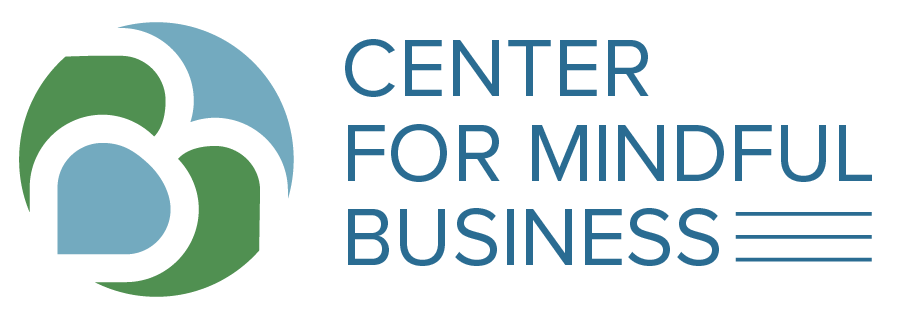MINDFUL BUSINESS TEACHER CERTIFICATION
Interested in teaching and/or consulting companies on wellness? The Center for Mindful Business is offering an incredible opportunity to become a Teacher to help organizations create and sustain a Mindful Business. Learn more.
Whether you are an external consultant or internal employee, you will learn how to help organizations use mindfulness best practices to become healthier, more effective, and profitable for the long term. You will be given a number of tools to increase positive impact and organizational success. By completing courses offered by CMB, you will have content expertise to teach the courses yourself. Get started now.
Overview of the Mindful Business Certification:
The Center for Mindful Business offers a Mindful Business Teacher Certification! This program is designed for two types of professionals: 1) Those internal staff who want to bring wellness and sustainable results to their organizations and 2) Those social entrepreneurs who want to bring wellness and sustainability to companies worldwide. Whether you want to deliver wellness internally or as an external teacher/consultant, you need to be given the content and tools to deliver the curriculum. By the end of the program, you receive a Certificate of Completion and be able to deliver the following content.
What is a Mindful Business?
A Mindful Business practices systemic wellness from the inside out and achieves sustainable results. Data shows that on an individual level, work is one of the two "leading causes of stress for three-quarters of Americans" (American Psychological Association). Additionally, "63% of employees who feel (stress-related) burnout are 2 -1/2 times more likely to look for another job" (Gallup), while turnover and lower productivity due to burnout "account for a loss of $322 billion a year" (World Economic Forum). This is a significant financial hit to organizations. Conversely, studies also show that organizations that practice Social Responsibility and Triple Bottom Line initiatives perform financially up to three times better than their competitors. This growing trend proves that organizations "do well by doing good". Learn more with our recently released article, What is a Mindful Business? written by Founding Partner, Don Thompson.
What is a Mindful Leader?
Successful leadership requires a specific set of skills that often go underdeveloped. With the constant demands of work and related stress, there is also often little time for personal development to learn the concepts and develop tools to be effective. According to leading business journals, common pitfalls of leaders include: Being reactive vs. proactive, avoiding conflict, treating people like machines, micromanaging, as well as, underestimating the importance of communication, listening, and emotional intelligence. However, studies also reveal common success factors of an effective leader. Successful leaders have “breakthrough thinking” and place emphasis on opportunities rather than solving problems. Even though proper task-management is important, they focus first on interpersonal relationships, effective communication, and training and development. They also use a democratic vs. command and control approach. Companies in the U.S. and abroad are adopting Mindfulness Meditation practices to drive their success. Among these companies are Google, Goldman Sachs, General Mills, T. Rowe Price, Nike, and HBO. Mindfulness Meditation is a tool for leaders to support the above-mentioned success factors and build individual and collective:
- Wellness and Resilience;
- Relationships and Collaboration; and
- Performance and Leadership.
Experts Agree:
In more recent years, the scientific community has been studying the connection between Mindfulness Meditation and leadership. The results show a pattern that in addition to reducing stress and providing a number of health benefits, meditation helps leaders achieve mental clarity and activates the prefrontal cortex for advanced interpersonal awareness and problem solving. A C-level professional describes how meditation is also linked to increased “compassion for others, and the ability to empower the people in your organization,” in addition to the ability to “maintain their equilibrium under constant pressure.” Mindfulness Meditation is a relatively easy way to apply tools in the present moment while in a work environment.
The Triple Bottom Line Drives Sustained Results:
Furthermore, thousands of companies worldwide have been achieving greater and more sustained success by adding social and environmental impacts to their profit bottom line. Microsoft, GE, DuPont, PepsiCo, and Whole Foods are among the companies who have adopted the concepts, practices, and metrics from the Triple Bottom Line (TBL) of people, planet, profit that can be measured by the Global Reporting Initiative (GRI) Standards. TBL and GRI practices and measures have been used for over 25 years and are gaining momentum – particularly in the U.S. and Western Europe. They are effective external ways for organizations to become healthier and more successful over the long-term.
Combining Mindfulness with the Triple Bottom Line:
By integrating Mindfulness Meditation with the TBL and GRI practices and metrics, organizations are better positioned to be healthier and more successful from the inside out. The benefits to companies that implement these practices?
- Sustained increased financial returns, customer satisfaction, and employee engagement;
- Reduced employee turnover and customer attrition; and
- The ability to recruit top talent, etc.

About the Teachers and Guest Speakers:
This course is taught by Heather Gwaltney, Founder/CEO of the Center for Mindful Business. She brings her years of experience teaching in both Corporate settings and as an Adjunct Professor, and integrates that with her 25 years of experience in communications, organizational development, and meditation. Co-Teachers, Satya Acharya and Jennifer Hannum will also be joining us. Satya will be addressing Financial Wellness and Sustainability, and Jennifer will be speaking to us as an Environmental Scientist about environmental impact (click here for more about the Teachers). Furthermore, you will hear from a number of Guest Speakers, including:
- Avivah Wittenberg-Cox, MBA, Named in ELLE Magazine as one of the "Top 40 Women Leading Change". CEO of 20-FIRST, TEDx Speaker, writer for Forbes and Harvard Business Review, and author of a number of best-selling, non-fiction books.
- Dave Feldman, MBA, Conscious Entrepreneur and Speaker. Co-Founder of Livability Project, Bethesda Green, and Virtues Matter.
- David Warschawski, CEO of Warschawski Marketing, PR and Branding Agency and Guest Lecturer at Johns Hopkins University's Carey School of Business, Digital Marketing Certification Course.
- Jenny Kassan, J.D., MCP., Attorney and Advisor to mission-driven organizations. President of Community of Ventures and Author of Raise Capital on Your Own Terms.
- Karl Weber, Co-author of The Triple Bottom Line: How Today's Best-Run Companies Are Achieving Economic, Social and Environmental Success - and How You Can Too. President of Karl Weber Literary.
- Tojo Thatchenkery, Ph.D., Author and Co-founder, Professor & Director of the Master’s in Organization Development and Knowledge Management program, Schar School, George Mason University.
- Violette de Ayala, Founder + CEO of FemCity, Author, and Speaker.
This program has been delivered as quickly as in six weeks, and we can customize to your organization's needs. Topics covered include the following:
Week 1: Introduction to Mindfulness Meditation and How to Apply at Work
The focus of this class is how to help professionals reduce stress, increase wellbeing, and enhance productivity. It is designed for professionals at all levels and across sectors. The instructor introduces the concept and practice of Mindfulness Meditation in a workplace setting. Participants are taught:
- Introduction to Mindfulness Meditation
- Reducing stress in the workplace
- Increasing resilience to change
- Gaining mental clarity and the ability to focus
- Cultivating "breakthrough thinking" and innovation
- Increasing the ability to communicate and resolve conflict
- Increasing engagement by dwelling in joy
Week 2: Mindful Leadership
In this class, the focus is on linking mindfulness to successful leadership factors, and how when used together, leaders cultivate healthier, more sustainable success – from the inside out. Specifically, Heather speaks about and facilitates exercises on topics, including:
- Making the case for Mindfulness
- Stress reduction and mental clarity
- Gender in leadership
- Communications and listening
- Conflict resolution
- Resiliency to change
- Cultivating creativity
- Power and sphere of influence
Week 3: Mindfulness and Social Capital
Social capital is defined as “the networks of relationships among people who live and work in a particular society, enabling that society to function effectively.” In an organizational setting, it is the implementation and measure of success in categories such as:
- Employee relations
- Health and safety
- Human rights (to include privacy)
- Anti-discrimination
- Training and education
- Community impacts
In this class, Heather speaks about and facilitates exercises on participant-selected social capital topic(s) most relevant to the needs of their organization -- integrating TBL/GRI, change management, and communications practices. She also illustrates how by using them together, students expand the definition of success in and impact of their organizations, and drive and measure social impact initiatives.
Week 4: Mindfulness and Environmental Impact
Environmental metrics vary depending on the type of company and sector. However, examples include:
- Pollutants emitted and carbon footprint
- Recycling and reuse
- Water and energy use
- Waste reduction
- Product impacts
In this class, Heather speaks about and facilitates exercises on participant-selected environmental impact topic(s) most relevant to the needs of their organization -- integrating TBL/GRI, change management, and communications. She also illustrates how by using them together, students can expand the definition of success in their organizations, and drive and measure environmental impact initiatives.
Week 5: Mindfulness and Financial Sustainability
It is clear that companies want and need financial success. What is less clear is the meaning of financial wellness and sustainability for both individuals and organizations. Is the company performing well, especially compared to their competition? Are the organization’s projects and culture in alignment with its values, purpose, and business drivers? How is the company performing over the long-term? Common measures of financial wellness include:
- Sales
- Net profits
- ROI
- Jobs created
- Supplier relations
Throughout the program, participants are introduced to the concepts and practice of Mindfulness Meditation and how it relates to systemic wellness, successful leadership, and sustainable organizational performance. By the end of the course, you will have the tools and mental models you need to teach within your own organization or to clients. Through a blend of lecture, visuals, mindfulness and case-study exercises, reflection, and dialogue, you will be able to help companies apply practical Mindfulness practices to their daily work experiences, as well as have a greater capacity to lead teams in a healthy, effective way.
Learn more. Still have questions? Reach out to us.
